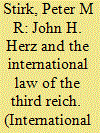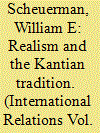| Srl | Item |
| 1 |
ID:
085417


|
|
|
|
|
| Publication |
2008.
|
| Summary/Abstract |
John H. Herz was unusual amongst the founding fathers of international relations in having paid detailed attention to the ideology and international law of the Third Reich in a study published in 1938. This article sets his investigation in the context of the turn away from law in the emerging discipline of international relations and the competing visions of Hans Kelsen and Carl Schmitt. It assesses developments in the international law of the Third Reich during the war years against Herz's own expectation of the emergence of a coherent doctrine, and concludes by suggesting that Herz's defence of international law has much to recommend it.
|
|
|
|
|
|
|
|
|
|
|
|
|
|
|
|
| 2 |
ID:
119272


|
|
|
|
|
| Publication |
2012.
|
| Summary/Abstract |
In contemporary international political theory, 'Cosmopolitanism' is typically juxtaposed to 'Realism', with many varieties of the former building on Kantian moral and political ideals, and the latter presumably rejecting Kant and his aspiration for far-reaching global reform. In agreement with a growing body of scholarship that seeks to challenge conventional views of Realism, this essay attends to the surprisingly complex views of the Kantian legacy (including Hans Kelsen, perhaps the most important neo-Kantian international thinker in the last century) within its ranks. Not all Realists have been unambiguously critical of Kant, and when in fact they have criticized him, they have done so for many different reasons. First-generation Realists (e.g. E. H. Carr, John Herz, Hans Morgenthau, Reinhold Niebuhr, Frederick Schuman and Georg Schwarzenberger) offered an ambivalent reading of Kantianism consistent with their endorsement of the ultimate desirability of major alterations to the global status quo, whereas second-generation Realists (i.e. Henry Kissinger and Kenneth Waltz) tended to read Kant so as to transform him into a forerunner of their own anti-reformist and institutionally conservative versions of Realism. An examination of Realism's rendezvous with Kantianism not only helps draw a more differentiated portrayal of Realism than is still found in much scholarship, but it also helps us understand how Realism dramatically changed within a relatively short space of time during the immediate postwar decades. It also points to some important potential starting points for a more fruitful exchange between Cosmopolitans and Realists.
|
|
|
|
|
|
|
|
|
|
|
|
|
|
|
|
| 3 |
ID:
120797


|
|
|
|
|
| Publication |
2013.
|
| Summary/Abstract |
The current study attempts to analyze the issue of the Diaoyu Islands based on relevant historical facts according to the methods of scholars of the Vienna School of Jurisprudence, as represented by Hans Kelsen, originator of the Pure Theory of Law. Although leading scholars of the Vienna School of Jurisprudence, represented by Kelsen did not experienced disputing the issue, Kelsen dealt with the case both directly in the material sense and indirectly in the formal sense, as well as in an abstract way. After a preliminary application of the Pure Theory of Law to a legal analysis of the case, it can be concluded that the Diaoyu Islands ought not belong to Japan. This shows that there is, to some extent, a backward-glancing aspect to Kelsenian theory. Kelsen's Pure Theory of Law may help us reach a further abstract understanding of human interaction in this "world village" as it evolves into Kelsen's ideal of a "world state" showing a forward-looking aspect of Pure Theory of Law.
|
|
|
|
|
|
|
|
|
|
|
|
|
|
|
|